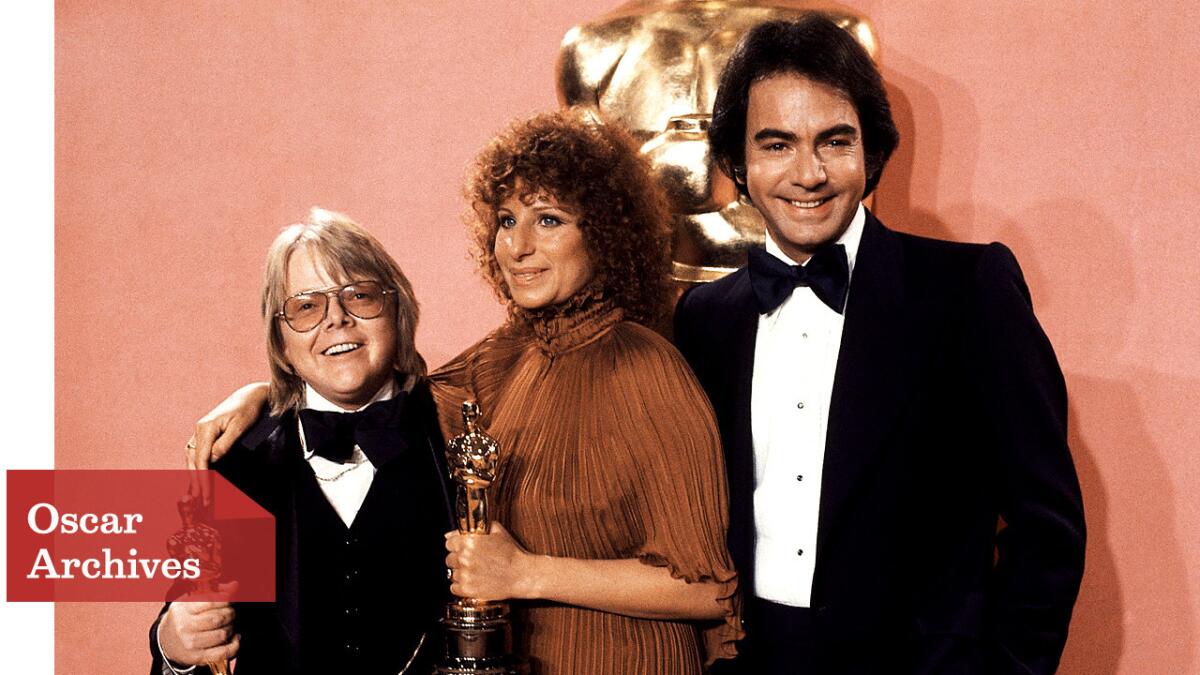Oscar archives: In ‘77: ‘Rocky,’ posthumous honor and Scorsese snub

The 49th Academy Awards in 1977 ushered in a watershed year in the history of the Oscars.
That ceremony marked the first time a performer was posthumously awarded an Academy Award and a previous lead actress winner received an Oscar for original song. Foreign filmmakers — including the first female director — and performers were among the marquee nominees, while one of cinema’s most influential directors failed to receive a nomination for what is now considered a landmark film.
And, finally, a tiny drama about a sad-sack underdog written and starring a struggling actor took home the top prize, beating out more artistic films that left tradition behind.
FULL COVERAGE: Oscars 2015 | Ballot
Best picture nominations that year went to Alan J. Pakula’s “All the President’s Men,” based on the book by Washington Post reporters Bob Woodward and Carl Bernstein chronicling how they cracked the Watergate Hotel break-in; Hal Ashby’s “Bound for Glory,” a biographical drama about folk singer Woody Guthrie; Sidney Lumet’s “Network,” a dark and prophetic comedy about the news media; John G. Avildsen’s “Rocky,” the uplifting drama about a scrappy boxer; and Martin Scorsese’s seminal noir thriller “Taxi Driver.”
As the envelope was opened that March 28, it was “Rocky,” written by and starring a then-little known Sylvester Stallone, that was named best film of the year, with Avildsen winning best director. The traditional underdog-hero film, which kicked off a successful franchise, also won for editing. And Stallone became the third person to snag Academy Award nominations for actor and original screenplay in a single year.
The best picture win took many by surprise. “I remember no one took ‘Rocky’ seriously at all,” said film historian and author Jan-Christopher Horak, head of the UCLA Film & Television Archive.
“Everyone was kind of shocked that ‘Rocky’ won, and it almost substantiated the feeling that the academy was going for popularity and quality wasn’t an issue,” said Horak.
Horak believes the film academy picked “Rocky” because, in 1977, “we were still in a transition period from the really old Hollywood to the new Hollywood, and ‘Taxi Driver,’ I’m sure it was too much of an abrasive film for the older members of the academy.”
Shockingly, Scorsese failed to receive a director nomination for that influential film.
“Rocky” was also very much about class, an issue that Hollywood hadn’t developed much of a taste for but that audiences embraced. “They were able to package it in a way that made it palatable” to voters, Horak said.
‘“Network,” he added, was “not unabrasive either” but was directed by veteran Lumet and written by longtime screenwriter Paddy Chayefsky. “I think maybe with ‘All the President’s Men,’ they decided it was too close to Watergate and they didn’t want to get into politics.”
Though “Network” didn’t claim the top prize, it became the first film since 1951’s “A Streetcar Named Desire” to win three acting awards: Peter Finch, who entered the cinematic history books as the first posthumous acting winner, was awarded for lead actor; Faye Dunaway received a lead actress Oscar; and Beatrice Straight a supporting actress award. Chayefsky, who received Academy Awards for 1955’s “Marty” and 1971’s “The Hospital,” won for his original screenplay.
“All the President’s Men” also won four Academy Awards: supporting actor for Jason Robards, adapted screenplay, art direction-set direction and sound.
Other highlights of the 49th Academy Awards:
Previous lead actress Oscar winner Barbra Streisand (for “Funny Girl”) won for her song “Evergreen,” along with Paul Williams, from the film “A Star Is Born.”
Three foreign performers received acting nominations: Liv Ullmann for “Face to Face,” Marie-Christine Barrault for “Cousin, Cousine” and Giancarlo Giannini for “Seven Beauties.”
Legendary “Citizen Kane” composer Bernard Herrmann, who died in December 1975, earned two posthumous original score nominations for “Obsession” and “Taxi Driver.” The prize went to Jerry Goldsmith for “The Omen.”
Two performers, who would go on to win the lead actress Oscar, earned their first nominations here: Sissy Spacek for lead actress in “Carrie” and Jodie Foster for supporting actress in “Taxi Driver.”
More to Read
From the Oscars to the Emmys.
Get the Envelope newsletter for exclusive awards season coverage, behind-the-scenes stories from the Envelope podcast and columnist Glenn Whipp’s must-read analysis.
You may occasionally receive promotional content from the Los Angeles Times.











